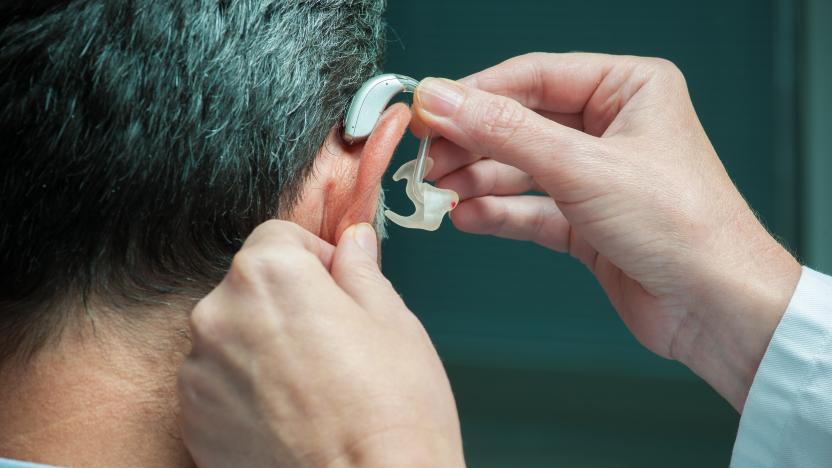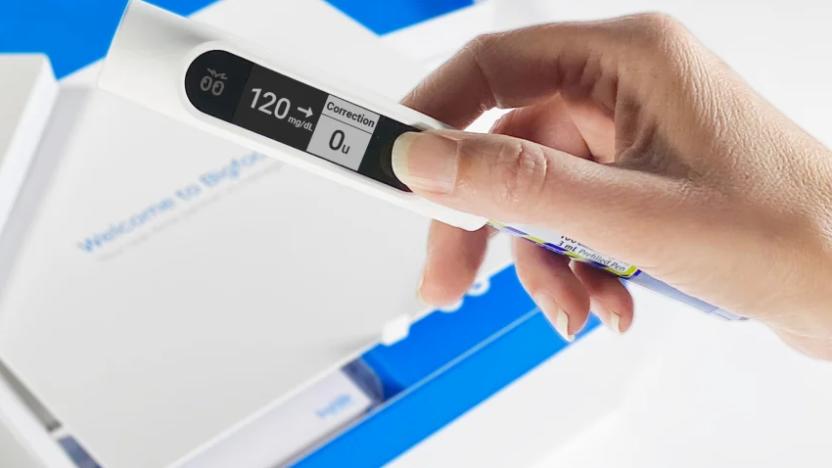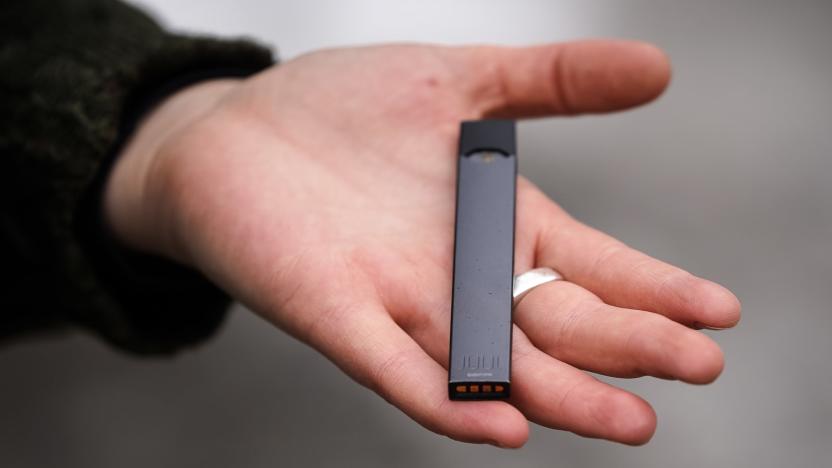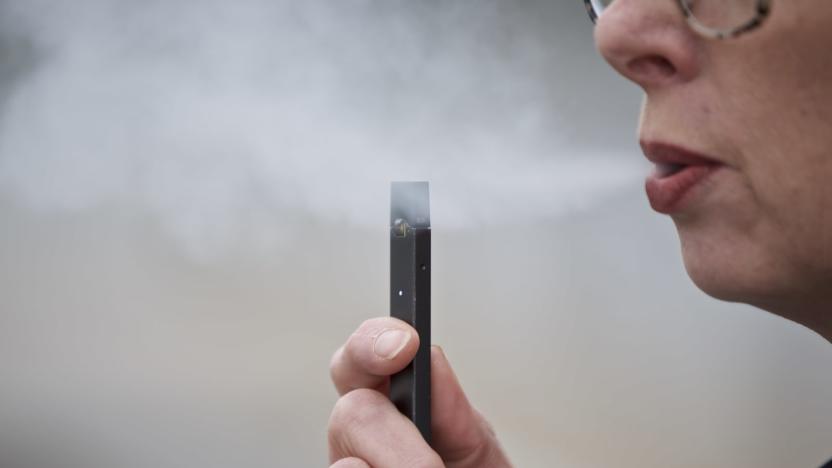Food and Drug Administration
Latest

Owlet's infant monitoring sock is back on sale in the US
After it was pulled from sale in the US last fall over a warning from the Food and Drug Administration (FDA), Owlet’s infant monitoring sock is once again available to purchase.

Owlet stops selling infant monitoring sock after FDA order
Following a warning letter from the Food and Drug Administration (FDA), Owlet has stopped selling its popular Smart Sock family in the US.

FDA proposes rule for over-the-counter hearing aids
When it's finalized, the measure should make it easier for people to access affordable hearing aids.

FDA approves the first smart insulin pen cap to help with dosing
Bigfoot Unity works with Abbott's FreeStyle Libre 2 glucose monitoring system.

The FDA has opened a criminal investigation into vaping
The Food and Drug Administration opened a criminal investigation into the vaping supply chain earlier this summer, it has emerged. The Office of Criminal Investigations started the probe following reports of a vaping-related lung illness. The agency now says more than 530 people have been affected, and seven deaths have been attributed to the illness thus far.

FDA criticizes Juul for telling students its e-cigs are ‘totally safe’
In a letter published today, the US Food and Drug Administration criticized Juul for telling students that its vaping products are "totally safe" and "99% safer than cigarettes." According to the letter, Juul portrayed its products as "modified risk tobacco products." That is, Juul presented its vaping products as having "a lower risk of tobacco-related disease or are less harmful than one or more other commercially marketed tobacco products." Such claims can only be made with FDA approval, which Juul did not have.

San Francisco set to become first US city to ban e-cigarettes
San Francisco has edged towards becoming the first US city to ban sales of e-cigarettes, as well as the manufacturing and distribution of them on city property. A preliminary vote saw city supervisors unanimously approve a ban on e-cigarettes the Food and Drug Administration has yet to review. It hasn't assessed any yet and companies have until 2021 to apply for reviews of their products under the agency's draft guidelines.

Why buy the cow when you can biofabricate the milk for free?
Thought to have been Lord Krishna's favorite animal, the cow has achieved a uniquely sacred status in India. Their slaughter is prohibited through most of the country, beef consumption is largely outlawed as well and woe be the unlucky soul accused of breaking those taboos. In the US, however, that's not the case. We Americans love our cows. We love them so much that we ate a whopping 25.668 billion pounds of beef in 2016, according to the National Cattlemen's Beef Association. There are 93.5 million heads of cattle in this country, but thanks to emerging biofabrication technologies, they could soon be as safe from the slaughterhouse as the cows of Delhi.

DARPA is helping six groups create neural interfaces for our brains
Elon Musk isn't the only one looking to rummage around inside your skull. DARPA announced on Monday that it has selected its five grant recipients for the Neural Engineering System Design (NESD) program, which it began at the start of this year. Brown University, Columbia University, The Seeing and Hearing Foundation, the John B. Pierce Laboratory, Paradromics Inc and the University of California, Berkeley will all receive multi-million dollar grants to help develop various aspects of the emerging technology.

Concentrates are the future of cannabis
The cannabis industry is in the midst of an unprecedented renaissance. Strains are stronger, consumption methods more numerous and availability greater than ever before. Medical-grade marijuana now averages around 20 percent THC -- a threefold increase from the "hippie weed" your parents toked back in the '60s. Smoking has been usurped by vaping and edibles as the preferred dosing methods, making the concentrates and oils more valuable commodities than the flowers they're derived from. The good times certainly are rolling, but how long can we keep up this relentless march toward pure THC distillate?

National Academy of Sciences endorses embryonic engineering
The next generation of humans may well be genetically modified. The National Academy of Sciences on Tuesday issued a 216-page report endorsing human germline modification in the future, but only in certain cases that would otherwise result in children being born with serious genetic diseases.

Wearable artificial kidney hopes to gain FDA approval soon
As neat as your smartwatch is, there are other existing wearables which, you know, can actually make the world a world a better place -- though that's not to say whatever you have on your wrist now is useless and for pure vanity purposes. Aptly named the Wearable Artificial Kidney, a projected started back in 2008, this medical gadget hopes to make the dialysis process better for patients, thanks in particular to its portability features. As opposed to the more traditional, stationary machines found at hospitals or in homes, which tend to be extremely heavy, the current version of WAK weighs a mere 10 lbs (around 4.5 kg.) and can be attached around a person's waist.

FDA approves Proteus Digital Health's e-pills for dose monitoring
An "ingestible sensor" doesn't sound like the tastiest of snacks, but soon it might be just what the doctor ordered. A tiny microchip which activates upon contact with stomach acid has recently been given the green light by the US FDA. When the sensor is swallowed, an external patch picks up its signal and shoots a message over to whoever it's supposed to. The technology is aimed at tackling an issue known in the healthcare biz as compliance -- or, following instructions. Correct timing and dose are important for many drugs, and lax schedules can be responsible for treatment failures or the development of nasty drug-resistant bugs. Although the pills have only been used in trials, one pharmaceutical heavyweight has already bagged a license to the technology for real-world applications. If you don't like the thought of a belly full of microchips, no need to worry -- the harmless sensors pass naturally after completing their mission.

Daily Update for October 18, 2011
It's the TUAW Daily Update, your source for Apple news in a convenient audio format. You'll get all the top Apple stories of the day in three to five minutes for a quick review of what's happening in the Apple world. You can listen to today's Apple stories by clicking the inline player (requires Flash) or the non-Flash link below. To subscribe to the podcast for daily listening through iTunes, click here. No Flash? Click here to listen.

E-cigarettes contain carcinogens and toxins after all, FDA warns
In case you ever of the mindset that e-cigarettes were somehow toxin free, at least compared to the more traditional smokes, along comes the FDA to shatter your illusions. A report this week from the government agency calls out the product with a safety warning, charging that the cartridges they examined contained "carcinogens and toxic chemicals such as diethylene glycol, an ingredient used in antifreeze." The FDA says it can't confirm the extent of the health issues, as it's only done limited testing and it hasn't been formally submitted for review, but it doesn't look quite as risk-free as previously touted. Don't say the WHO never warned ya. So remind us again, what's the point in smoking one of these over an old school cigarette?[Via Switched; thanks, flatlander85]

iPods won't crash your pacemaker says the FDA
It turns out that 17-year-olds probably aren't that good at studying electrical interference -- and its effect on pacemakers -- created by iPods. Unlike the data presented to the Heart Rhythm Society last year by a high-school student, which demonstrated the music player's ability to interfere with heart-regulating devices, the FDA now says that the gadgets are completely safe for use. Researchers measured magnetic fields produced by four different models of Apple's ubiquitous device, and found no reason why your grandmother can't keep jamming to her South of Heaven reissue. Said FDA researcher Howard Bassen, "Based on the observations of our in-vitro study we conclude that no interference effects can occur in pacemakers exposed to the iPods we tested." We hope the FDA will follow this up with a definitive study on the effects of boomboxes on hip implants.






